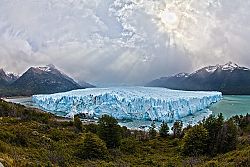

New research, which has examined 200 research papers published since 2008, has suggested that the current rate of warming in Earth's climate could result in us crossing six climate tipping points.
The Intergovernmental Panel on Climate Change (IPCC) first introduced the idea of these tipping points 20 years ago. The idea is, if the tipping points are crossed, then it could result in a significant change in the way Earth's natural systems operate and could even be irreversible. Once a point is tipped over, the breakdown of the system is self-sustaining so will continue even if warming is stopped.
The new research has found that the following six tipping points are "likely" to be crossed:
It was always thought that such tipping points would not be crossed until global average temperatures increased to more than 5°C. However, research has suggested that they will be crossed much earlier than originally thought.
For instance, some of the destabilisation which comes after a system breakdown is already being observed in the polar regions. Greenland and Antarctica are losing ice six times faster than 30 years ago, and the Greenland ice sheet has been shrinking continuously for the last 25 years.
Other tipping points, such as the dieback of the Amazon Rainforest, aren't expected to occur until the global temperature rise reach 3.5°C. However, all natural systems are connected in different ways, so there is a real concern that once one system fails then others could also begin collapsing. For example, when ice sheets shrink less of the sun's energy is reflected. This leads to warming which then impacts other natural systems.
Back in July, UN chief António Guterres told ministers from 40 countries that "Half of humanity is in the danger zone, from floods, droughts, extreme storms and wildfires. No nation is immune. Yet we continue to feed our fossil fuel addiction." He warned "We have a choice. Collective action or collective suicide. It is in our hands."
With news that new Prime Minister Liz Truss is intending to lift the ban on fracking and invest more in North Sea oil and gas, it is a worrying time for our climate. This latest research shows how important it is to act now. As Mr Guterres stated, it's in our hands.
Would you like more news like this from Cedrec in your email? Then sign up for our free monthly bulletins.
If you want a bit more, you can also take a trial of our system and see how we make legislation simple!